新概念被动语态
新概念英语第一册:被动语态2

新概念英语第一册:被动语态2被动语态英语动词有主动语态和被动语态之分。
在主动句中,动词的主语是执行动作的人或物。
在被动句中,主语是动作的承受者。
在英语中被动词态用得很普遍,这样做能够避免用不明确的词作主语,或是将说话的重点放在事件而不是造成该事件的人或物上。
被动语态的构成: be +过去分词。
过去分词不一定指过去。
请看例句:(1)一般现在时形式: am/are/is +过去分词:The room is aired regularly.这个房间定期通风。
The knives are sharpened regularly.刀定期磨。
(2)一般过去时形式: was/were +过去分词:She was dressed in red.她身穿红色衣服。
The windows were opened this morning.窗户今早是开着的/被打开了。
(3)英语中表达感情的动词通常可用于被动式,这些动词如amuse, embarrass, worry, surprise, interest, upset等:She is embarrassed.她感到尴尬。
They were worried.他们感到担忧。
词汇学习 Word study1.embarrassed adj.(1)尴尬的;局促不安的:He felt so embarrassed at that moment.在那一刻,他感到如此尴尬。
The girl was very embarrassed to speak in front of so many strangers.在如此之多的陌生人面前讲话,那个女孩子很是局促不安。
(2)陷入困境的;拮据的:He was financially embarrassed.他经济上陷入了困境。
He says that he is embarrassed at the moment, but he will be able to pay you next month.他说他当前手头紧,但下个月就能够付钱给你。
新概念二被动语态

I drink milk every day.
被动语态: 主语是动作的承受者
Milk is drunk by me every41-144
1. 一般现在时:
主动语态
主语+ V原形/V三单
被动语态
主语+ am/is/ are + p.p
Exercises
1. I drink milk every day. Milk is drunk by me every day. 2. I drank milk yesterday. Milk was drunk by me yesterday. 3. I will drink milk soon. Milk will be drunk by me soon.
4. I am drinking milk now. Milk is being drunk by me now.
5. I have drunk milk. Milk has been drunk by me.
6. I was drinking milk at that time yesterday. Milk was being drunk by me at that time yesterday.
3. 一般将来时:
主动语态
主语+ will + V原 (主+shall/be going to + V原)
被动语态
主语+ will be + p.p (主+ shall be/ be going to be + p.p)
I will clean my room this afternoon. My room will be cleaned by me this afternoon.
新概念第二册语法知识点汇总
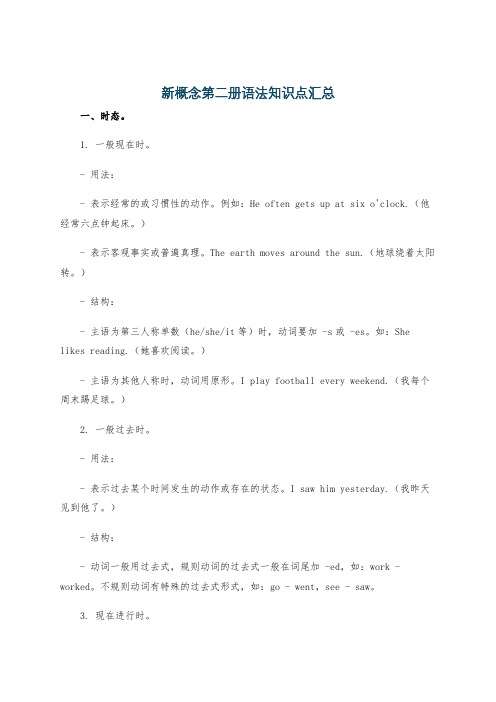
新概念第二册语法知识点汇总一、时态。
1. 一般现在时。
- 用法:- 表示经常的或习惯性的动作。
例如:He often gets up at six o'clock.(他经常六点钟起床。
)- 表示客观事实或普遍真理。
The earth moves around the sun.(地球绕着太阳转。
)- 结构:- 主语为第三人称单数(he/she/it等)时,动词要加 -s或 -es。
如:She likes reading.(她喜欢阅读。
)- 主语为其他人称时,动词用原形。
I play football every weekend.(我每个周末踢足球。
)2. 一般过去时。
- 用法:- 表示过去某个时间发生的动作或存在的状态。
I saw him yesterday.(我昨天见到他了。
)- 结构:- 动词一般用过去式,规则动词的过去式一般在词尾加 -ed,如:work - worked。
不规则动词有特殊的过去式形式,如:go - went,see - saw。
3. 现在进行时。
- 表示现在正在进行的动作。
Look! She is dancing.(看!她正在跳舞。
)- 结构:- be动词(am/is/are)+动词的 -ing形式。
He is reading a book.(他正在读一本书。
)4. 过去进行时。
- 用法:- 表示过去某个时刻或某段时间正在进行的动作。
At that time yesterday, I was doing my homework.(昨天那个时候,我正在做家庭作业。
)- 结构:- was/were+动词的 -ing形式。
They were playing football at threeo'clock yesterday afternoon.(他们昨天下午三点正在踢足球。
)5. 现在完成时。
- 用法:- 表示过去发生的动作对现在造成的影响或结果。
I have lost my key.(我把钥匙丢了。
新概念二45被动语态
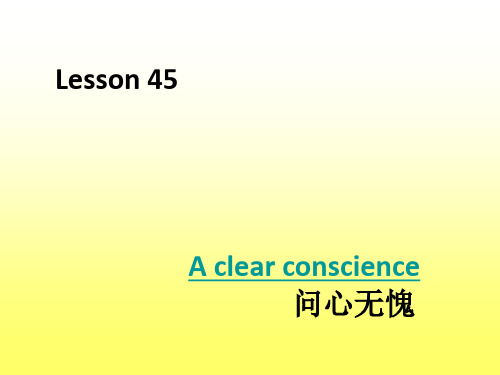
Listen and anwser: 1.This story is about ___. A. Sam Benth B. Sam Benton C. Benth 2.Did he found his wallet outside his front door ? A.Yes ,he did B. No ,he didn’t 3.How much money was sent to the owner in total ? A.100 per cent B.25 per cent C.75 per cent
6.In time, all Sam's money was paid back in this way. 含一般过去式的简单句。 (1)in time可以表示“经过一段时间” 或“最终”、“迟早”: 我最终/总有一天会把一切都告诉你 的。 I'll tell you everything in time.
(2)in this way表示“用这样的方式”: eg:必须注意你的拼写,这样你才能最终成为 一个 好秘书。 You must pay attention to your spelling. In this way, you can become a good secretary in time. in a way ①在某一方面来说;在某种意义上 eg:You’re correct in a way. ②有点,有几分 wg:She is strange in a way.
• More questions
• 1. What had been lost in the village . • 2.Who lost the money? • 3.Sam was sure that the wallet must have been found by one of the villagers, but was it returned to him? • 4.How long did the money begin to return back ? • 5.How much money was contained in the newspaper? • 6.Was all the money returned back?
新概念英语第一册第49课
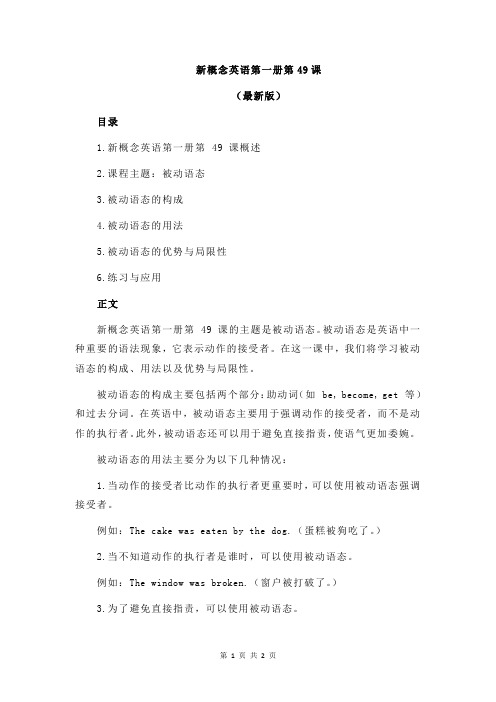
新概念英语第一册第49课(最新版)目录1.新概念英语第一册第 49 课概述2.课程主题:被动语态3.被动语态的构成4.被动语态的用法5.被动语态的优势与局限性6.练习与应用正文新概念英语第一册第 49 课的主题是被动语态。
被动语态是英语中一种重要的语法现象,它表示动作的接受者。
在这一课中,我们将学习被动语态的构成、用法以及优势与局限性。
被动语态的构成主要包括两个部分:助动词(如 be, become, get 等)和过去分词。
在英语中,被动语态主要用于强调动作的接受者,而不是动作的执行者。
此外,被动语态还可以用于避免直接指责,使语气更加委婉。
被动语态的用法主要分为以下几种情况:1.当动作的接受者比动作的执行者更重要时,可以使用被动语态强调接受者。
例如:The cake was eaten by the dog.(蛋糕被狗吃了。
)2.当不知道动作的执行者是谁时,可以使用被动语态。
例如:The window was broken.(窗户被打破了。
)3.为了避免直接指责,可以使用被动语态。
例如:The mistake was made by him.(错误是他犯的。
)被动语态的优势在于可以强调动作的接受者,使句子更加客观、委婉。
然而,被动语态也有局限性,它不能表示所有的动作,例如一些不及物动词和动词短语不能用于被动语态。
在学习被动语态后,我们需要进行大量的练习和应用,以巩固所学知识。
可以通过阅读、写作和口语练习,不断提高自己的英语水平。
总之,新概念英语第一册第 49 课让我们了解了被动语态的构成、用法和优势与局限性。
新概念英语一总结练习七_被动语态

新概念英语一总结练习七被动语态【复习】一、总述:英语动词有两种语态,即主动语态(The Active Voice)和被动语态(The Passive Voice).主动语态表示主语是动作的执行者。
被动语态表示主语是动作的承受者。
They will build a new bridge over the river. (主动)A new bridge will be built over the river. (被动)汉语中常用“被”、“给”、“由”、“受”等词用来表示被动,而英语用:助动词be + 及物动词的过去分词构成。
二、被动语态的形式1) 常用时态的被动语态的构成:被动语态的基本形式为助动词be + 及物动词的过去分词,即be done。
被动语态的时态、人称和数的变化主要体现在be的变化上,其形式与系动词be的变化形式完全一样。
以give 为例,列表如下:一般现在时:am / is / are + given一般过去时:was / were +given一般将来时:shall / will +be+ given过去进行时:was / were + being + given现在进行时:am / is / are + being + given过去完成时:had + been + given现在完成时:have / has + been + given将来完成时:shall / will + have been + given过去将来时:should / would +be+ given现在完成进行时:have/has been being done含情态动词的被动语态:情态动词+be done[注]被动语态没有将来进行时和过去将来进行时。
2)被动语态的否定式:在第一个助动词后加not构成。
Russian is not taught in our school. 我们学校不教俄语。
3)被动语态的疑问式:把第一个助动词提到主语之前,句尾加问号构成。
新概念二被动语态的课文
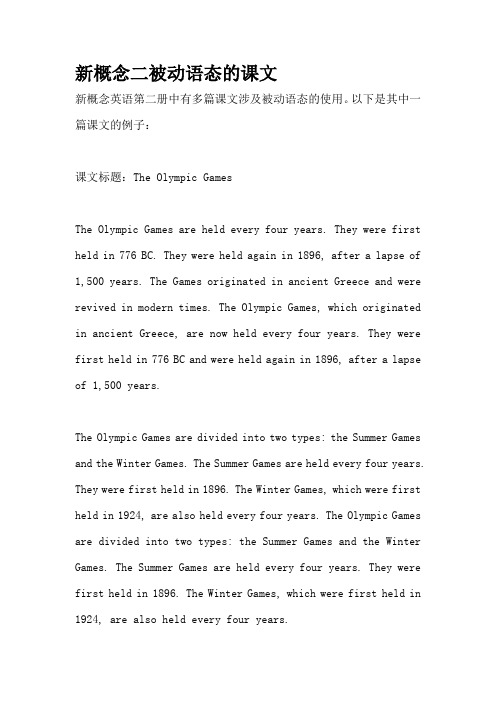
新概念二被动语态的课文新概念英语第二册中有多篇课文涉及被动语态的使用。
以下是其中一篇课文的例子:课文标题:The Olympic GamesThe Olympic Games are held every four years. They were first held in 776 BC. They were held again in 1896, after a lapse of 1,500 years. The Games originated in ancient Greece and were revived in modern times. The Olympic Games, which originated in ancient Greece, are now held every four years. They were first held in 776 BC and were held again in 1896, after a lapse of 1,500 years.The Olympic Games are divided into two types: the Summer Games and the Winter Games. The Summer Games are held every four years. They were first held in 1896. The Winter Games, which were first held in 1924, are also held every four years. The Olympic Games are divided into two types: the Summer Games and the Winter Games. The Summer Games are held every four years. They were first held in 1896. The Winter Games, which were first held in 1924, are also held every four years.The Olympic Games are held in different countries. They are held in different cities of the world. The Games are held in different countries. They are held in different cities of the world.The Olympic Games are very popular. They are watched by millions of people all over the world. The Games are very popular. They are watched by millions of people all over the world.注意:以上课文中的被动语态使用较为简单,主要是通过将主语改为被动语态的形式来表达被动意义。
新概念英语第二册Lesson10被动语态含答案.ppt
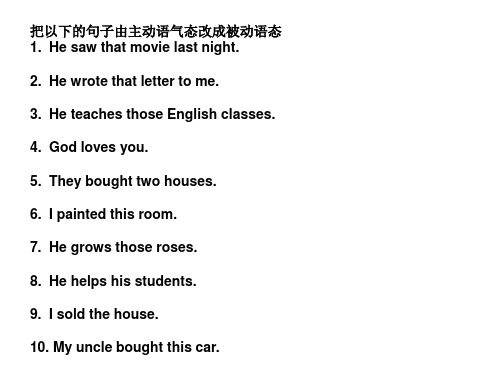
把以下的句子由被动语态改成主动语态 1. The policeman was seen by me. 2. Those two books were written by me. 3. These sentences were corrected by my teacher. 4. He was hit by a car. 5. His door was locked by me. 6. His house was built by my father. 7. His boat was given to me by my father. 8. This bird is rarely seen by people here. 9. He is liked by every one. 10. They were given ten dollars by their friends.
把以下的句子由主动语气态改成被动语态 1. He saw that movie last night. 2. He wrote that letter to me. 3. He teaches those English classes. 4. God loves you. 5. They bought two houses. 6. I painted this room. 7. He grows those roses. 8. He helps his students. 9. I sold the house. 10. My uncle bought this car.
11. This picture was taken by him. 12. Too much wine was drunk by tt by Mr. Wang. 14. He was helped by his father. 15. They were served by that waiter. 16. His food was prepared by my mother. 17. His toy was made by my sister. 18. The book was returned to me by Jim. 19. That song was written by my brother. 20. I was invited by him to a party.
- 1、下载文档前请自行甄别文档内容的完整性,平台不提供额外的编辑、内容补充、找答案等附加服务。
- 2、"仅部分预览"的文档,不可在线预览部分如存在完整性等问题,可反馈申请退款(可完整预览的文档不适用该条件!)。
- 3、如文档侵犯您的权益,请联系客服反馈,我们会尽快为您处理(人工客服工作时间:9:00-18:30)。
Some cakes are made by mother.
2. They term.
bought
ten computers last
Ten computers were bought (by them) last term. 一般过去时:S+was/were +过去分词
3.Amy can take good care of Gina . Gina can be taken good care of by Amy.
情态动词:
S+ can/may/must/should + be+过去分词
4.They will finish the work in ten days.
The work will be finished (by them)
in ten days.
一般将来时: S+ will+be+过去分词
5.
S+ was/were+being+过去分词
各种时态的被动语态构成
一般现在时: S+am/is /are +P.P(过去分词) 一般过去时: S+was/were +P.P. 情态动词:
S+ can/may/must/should + be+ P.P.
一般将来时:
S+ will+be+ P.P.
现在进行时: S+ am/is/are + being + P.P. 现在完成时: S+ have/has + been+ P.P. 过去进行时: S+ was/were+being+ P.P.
被动语态
1)概念: 英语动词有两种语态,即主动语态和被动语态. 主动语态表示主语是动作的执行者,被动语态表示 主语是动作的承受者 2)结构: 主语+ 助动词 be+及物动词的过去分词+其 它 3)时态要求:助动词 be 必须与主语的人称和数一致, 常用的时态有八种. 4)用法:在不知道谁是动作的执行者,或者没有必要指 出谁是动作的执行者.
被动语态: 主动语态表示主语是动作的执行者,宾 语是动作的承受者。当动作的承受者作主语时, 就构成被动语态。 构成: be+动词的过去分词 1. We speak English. (主动语态) English
2. Mother
is spoken
makes
一 般 现 在 时 的 被 by us. (被动语态) 动 语 some cakes. 态
Twenty more keys have been made by us. 现在完成时:
S+ have/has + been+过去分词
7.I was doing my homework at 8:00 last night. My homework was being done (by me) at 8:00 last night. 过去进行时:
Some workers are painting the rooms now.
The rooms are being painted by some workers now. 现在进行时: S+ am/is/are + being +过去分词
Байду номын сангаас
6.We have made twenty more keys.
